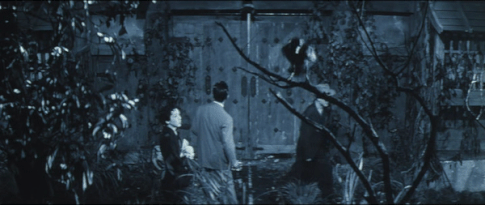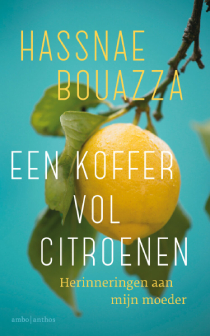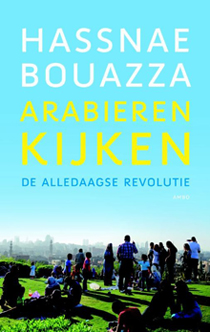Five more Japanese movies to look out for
Peter Breedveld

Scène uit Bōrei Kaibyō Yashiki (Het Huis van de Spookkat, 1958)
The weekend before last I enjoyed the Amsterdam branch of the Camera Japan Film Festival, which had a Rotterdam edition yet a week earlier. I wrote about the five films I saw there on our sister site, or rather girlfriend site, Aicha Qandisha.
By the way, I am writing this in English because I know some people, who would be interested in reading about Japanese movies, don’t know Dutch or at least not well enough to read a whole piece in Dutch.
The Amsterdam edition was held in Kriterion, a cinema run by students. The Japanese films on the program were crammed in between the regular showings, whereas in Rotterdam the whole Lantarenvenster theatre was reserved for the festival exclusively. In Amsterdam, unfortunately, this meant a lot of the flair of the Rotterdam edition was lost.
Also, the Japanese films clearly had no priority. For instance, the movie The Fable by director Eguchi Kan, which was planned for the biggest room in Kriterion, with the most comfortable seats, was moved at the last moment to another, smaller room because of the première of the Joker movie. Totally understandable, but unfortunate for us, festival-goers.
Corrupted Blu-ray disc
Worse was the fact that the projection of the film underwent quite some problems. The movie faltered a few times at the beginning and had a lot of static snow, which everybody seemed to find perfectly acceptable. Then, during the climax in the last half hour, the film faltered again and was stopped, after which we were told that “the disc was corrupted” and that we could get a free drink at the bar.
Which is a real shame, because The Fable is a really good action flick, very funny, very well directed and thrilling. The film showed in Rotterdam without any problems so I assume someone must have treated the disc like a Philistine, stood on it, used it to cut his cocaine or as a frisbee or coaster. Also, don’t you test play those discs before the actual showing?
Anyway, I complained about it and was virtually laughed at by the employee I spoke to. She just didn’t care at all. Whatever. “Projecting movies is a difficult job”, she told me. It was a Blu-ray disc. Everybody can play Blu-ray discs, we do it all the time, at home! She also said Kriterion was run by students, as if that explained everything. She didn’t want to talk to me anymore when I asked what exactly it was they studied.
The thing is, the film I saw earlier that day, Kobayashi Shotaro’s Only the Cat Knows, had the same problem. It faltered at the beginning and it took a while for the staff to even notice something was wrong. Ultimately we did see this film until the end. It made me worry about the rest of the films I had bought tickets for but those viewings went well, so in the end I look back at a very satisfying festival.
The Fable
Still too bad about The Fable, a great and very violent yakuza action comedy like Takashi Miike sometimes makes them, although this movie may be more indebted to the Korean action movies by directors like Park Chan-wook and Lee Won-tae. Above all the movie is very funny with a hilarious main part by actor Okada Junichi, who combines Buster Keaton’s straight-faced imperturbability with the fearless oaf-like comedy Mifune Toshiro sometimes displayed in his movies, like Red Lion.
I don’t see a premiere set for the Dutch theaters anytime soon, but I sure hope to see the complete film sometime not too distant in the future.
Only The Cat Knows
I was less impressed with Only The Cat Knows, a sappy comedy about an elderly couple who have become estranged from each other, and are more or less forced to deal with this reality when their cat disappears. There is a lot of situational comedy with their grown-up children suspecting their mother of having an affair and such-like. Many people like this movie and it has good reviews, but this really is not for me.
Jesus
Two days later I saw Jesus by 22-year old director Okuyama Hiroshi, about a boy, Yura, from Tokyo, who moves with his parents to a small town somewhere in northern Japan. He ends up at a Christian school there, apparently the only high-school available in that village. The boy, raised as a regular shinto-buddhist secular Japanese, is immediately fascinated by the iconography of this strange, outlandish religion and by the figure of Jesus Christ, who becomes his silent imaginary friend, a half-witted doofus who is utterly useless at everything.
As a Westerner it’s interesting to look at Christianity through this Japanese child’s eyes, to see the alienation provoked in him by the Bible texts and the Christian images. He looks at them with a mixture of curiosity and disbelief and observes the grown-ups at his school almost like exotic animals.
Here follows a spoiler: tragedy strikes in the shape of the death of his new-made friend, a class mate with whom he shares a love for soccer. In the aftermath of this death he decides he has no use for the Christian religion and his imaginary friend.
Okuyama shows this by putting Yura in front of the mother of his dead friend during a memorial service organized by his school. The mother looks totally destroyed by grief and Yura, who is asked to recite something from the Bible in honor of his friend, realizes how empty the words are he is about to say, about the promise of God’s eternal love and everlasting happiness in heaven, when the woman in front of him is almost dying from grief.
I found this so hard-hitting, so intelligently observed and staged, so impeccably directed and envisioned, that I was truly struck with awe by this scene. Best of all is that the scene is undeniably funny in an ink-black manner. Okuyama shows us how utterly absurd it is, from the perspective of a Japanese, to expect people to be lifted up by Jesus’ promise of eternal happiness in God’s glittering light, when they just suffered the loss of their own child.
Only 22 years old is this prodigy. I can’t wait to see what he has got up his sleeve for the future.
Love at Least
A really well written scene that struck me is at the beginning of the film Love at Least by Sekine Kosai, about a young woman, Yasuko, dealing with severe depression. When she has an attack during a night out with some female friends, a young man comes to pick her up at their request. He is all patient and understanding about it and has no problem with calling his work to tell he will quit the day earlier to take care of his friend.
And then just when his status as a saint seems to be settled, Yasuko, in her brutal directness, reproaches him for having, as a journalist for a gossip paper, exposed the sexual escapades of a starlet who then tried to commit suicide.
BAM! This really sets the tone for the film, that never gets melodramatic or pathetic but deals with psychological disorder in a roundabout, matter-of-factual way. There are no real assholes and no saints in this film, just people trying to deal with a woman suffering from very harsh bouts of depression, some people succeeding better at it than others. There is one woman, the former lover of her not so saintly friend, pestering her from jealousy, but she seems to be having serious issues herself.
The main role is a real tour the force done really impressively well by actor Shuri (just a single name), who overwhelms the viewers with her electric presence and wins them over with her undeniable, quirky charm. Her story is tragic, but there is also a lot of comedy here. Especially when Yasuko’s illness confronts others with their own short-comings and pettiness. In the end, this is a very touching and gripping film, fairly brilliant.
Every Day a Good Day
The finale of the festival (at least for me) was the last movie of Kiki Kirin, one of the greatest actors of modern Japanese cinema, who sadly died earlier this year. In Every Day a Good Day, directed by Omori Tatsushi, Kiki plays a teacher of the Japanese tea ceremony, guiding a young woman not only in the way of tea, but through this ceremony in the way of life, of accepting the hardships and learning to appreciate the blessings, however small.
Sappy as this may sound, Omori has made a beautiful and rather compelling film about a quite uneventful life of a woman, as uneventful as the lives of most of us which are, of course, considerably more eventful from our own perspectives, having to deal with failure and heart-break and disappointment, the loss of a loved one and our daily struggles.
Who wouldn’t feel up to it with a woman like Kiki Kirin having our backs? If only I had had a mother or a grandmother like Kiki Kirin, always patient and understanding but strict when she has to be, always there with the right advice.
I have seen many films with her, mostly as an old woman, hiding her sly intelligence behind her innocent frailty, often manipulating people into getting her way. In her best roles she teaches people to appreciate the value of a craft or of the profoundness of simple things, like in Kawase Naomi’s An, where she teaches Masatoshi Nagase, a baker of dorayaki, pancakes filled with bean paste, to take pride in his work by doing it right and with love and attention.
In Every Day a Good Day Kiki plays a similar role. She teaches women the way of tea and by it the appreciation of the different seasons and thus the fact that life is in constant movement of change. The tea ceremony is extensively demonstrated in the smallest detail, up until the proper way a napkin is folded, and while that could easily become a tedious affair, Kiki makes it a spectacle to behold, absorbing the attention of the viewers, entertaining them with her charismatic presence.
The film is a worthy farewell of a grand actor and a reminder what a great loss her death is for everyone who loves movies.
English, Film Reviews, Japan, 15.10.2019 @ 07:27






 RSS
RSS